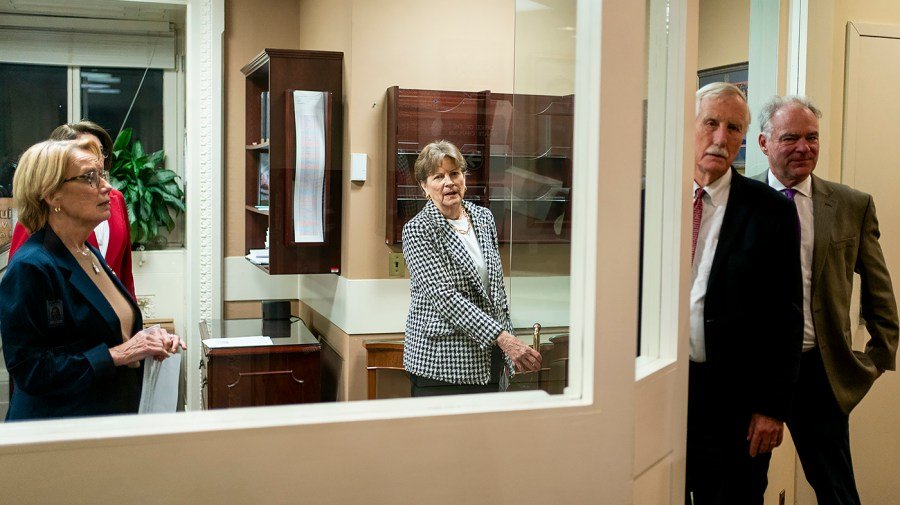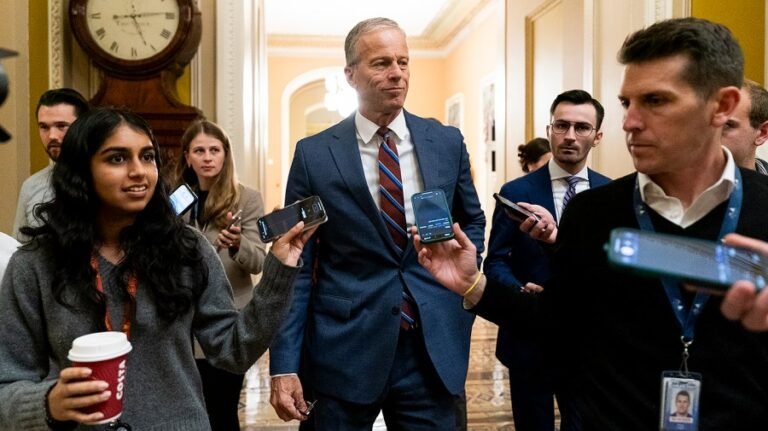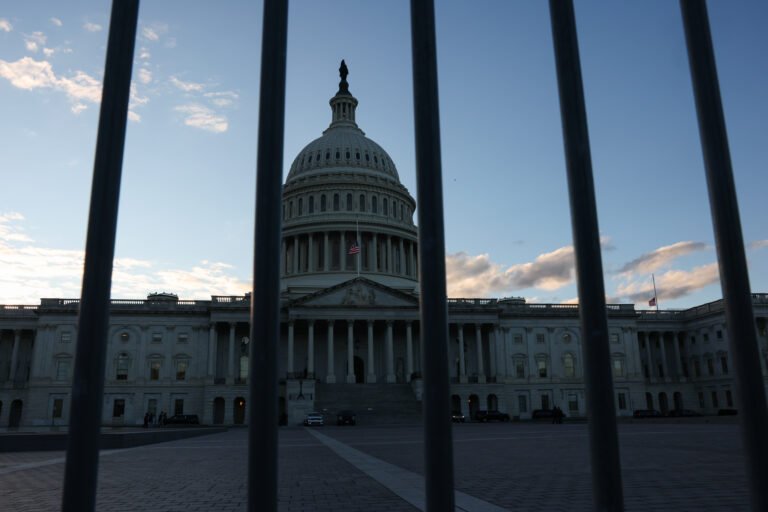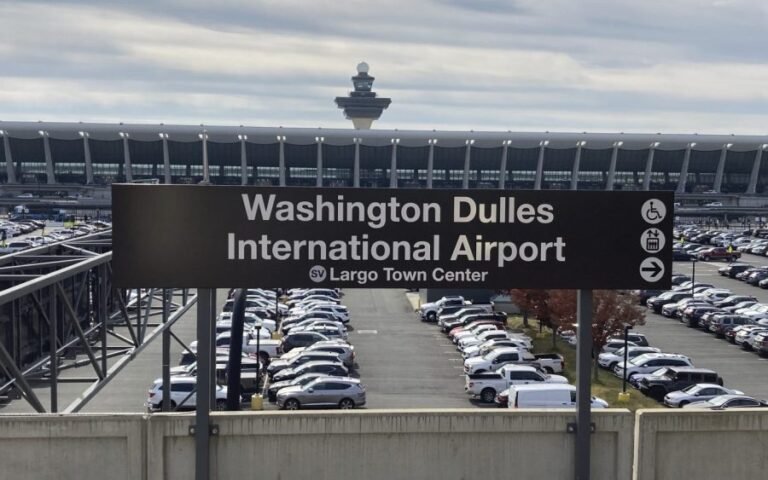
Sen. Tim Kaine (Va.), who nearly a decade ago served as Hillary Clinton’s running mate when she lost the presidency to Donald Trump, was the eighth Democratic senator to back a centrist deal the Senate is set to approve Monday that is likely to soon end the longest shutdown in American history.
Kaine’s top priority was to protect thousands of federal workers the Trump administration was attempting to fire during the government closure.
To win over Kaine, Senate Majority Leader John Thune (R-S.D.) needed to win the White House’s backing on the language affecting federal workers.
“We spent the day working on that language,” Kaine said, referring to the frantic negotiations Sunday. “We reached a meeting of the minds at about 5:45” Sunday afternoon.
Until then, Kaine said he didn’t have a deal with the White House on retaining the thousands of federal of employees targeted by reductions in force (RIFs). Just before a more than two hour Democratic caucus meeting Sunday where he announced his support for the deal — disappointing many in his party who wanted to continue fighting — Kaine won those assurances.
“We had a caucus meeting at 6 [p.m.] … I walked in just with a deadpan face and they’re like, ‘What’s going on.’ I said, ‘We got the language we need,’” he said.
The deal to end the shutdown must be approved by the House and signed by President Trump, but it is likely to clear those hurdles later this week, reopening the government.
Democrats are likely to battle for months over the decisions made by seven Democrats and Independent Sen. Angus King (Maine), who caucuses with Democrats, to back a deal that does nothing to extend subsidies under the Affordable Care Act (ACA) that are set to expire at the end of the year.
Liberal groups are already vowing to primary Democrats who back the bill, and it is possible very few House Democrats, if any, will back it.
Thune did promise a Senate vote on the health care subsidies issue as part of the package, but there’s no guarantee an extension will pass the Senate or get a vote in the House.
Even so, King and the Democrats who voted to reopen the government said they believed they had made the best call for the country.
King said it became increasingly clear as the shutdown dragged on for weeks that Republicans would not agree to extend the ObamaCare subsidies.
“The position the Republicans have been taking all along is we’re not going to negotiate about the ACA as long as the government is shut down. Maybe in the first week we weren’t so sure they were for real. In the second week, third, fourth, fifth, sixth week, it became clear that the [Democratic] strategy wasn’t working. They weren’t going to come back and say we want to do something on the ACA,” King explained.
The Maine senator getting Thune to agree to a vote on extending the subsidies was a “big deal.”
“Otherwise, the Democrats have no way to get a bill to the floor. It goes through the majority leader. When he says, ‘I guarantee you a vote on a bill you write on a date you select, that’s a big deal,” King said.
Abandoning Schumer’s strategy
In backing the deal, the Democrats abandoned Senate Minority Leader Chuck Schumer’s (D-N.Y.) strategy of keeping the government shut down to win major health care concessions.
It came together in the final hours of high-stakes negotiations.
Kaine said there “was a lot of resistance” from the White House to restoring the employees laid off during the shutdown, but Republicans eventually accepted the provisions he wanted in the bill because “they needed my vote.”
Other important players in the standoff — such as Toby Hawk, a senior air traffic controller at O’Hare International Airport in Chicago — helped deliver Senate Democratic Whip Dick Durbin’s (Ill.) vote for the package.
Durbin and other Democrats said they were worried about the pain the shutdown was causing.
“Part of it … was my friend Toby Hawk who heads up the air traffic controllers in the tower near O’Hare. I’ve known him since the shutdown in Trump’s first term,” Durbin said. “I had a long conversation with him just a few days ago. I’m genuinely worried that we’re giving these air traffic controllers six 10-hour shifts each week.
“Some of them have gone to other leaders in that [air traffic control] tower and asked to be furloughed so they could go get a job to make some cash money to make the payments for their families. When these controllers are keeping airplanes safe in the air, I don’t want them worried about the paychecks and problems that they have at home.”
Durbin was also moved by the strong statement issued by American Federation of Government Employees President Everett Kelley, who urged Democrats on Oct. 27 to pass a clean continuing resolution to reopen the government.
“It was part of it,” Durbin said of the pressure from the largest federal employees union.
Durbin told Senate Democratic colleagues at a closed-door meeting that he would vote to reopen the government because it’s “the right thing to do.”
Sen. Susan Collins (R-Maine), the chair of the Senate Appropriations Committee, used her longtime relationship with Sen. Jeanne Shaheen (D-N.H.), a fellow appropriator, to work out the final version of minibus package funding military construction, veterans affairs, the Department of Agriculture and the legislative branch.
She and Shaheen also negotiated the continuing resolution attached to the minibus to fund the rest of government through Jan. 30.
Shaheen, who will retire at the end of next year, was critical in bringing Sen. Maggie Hassan (D-N.H.), her home-state colleague, into the negotiating group.
All of the Democrats backing the deal are senators who are either retiring, in the cases of Shaheen and Durbin, or who do not face voters again until 2028 or 2030. In addition to Hassan, Shaheen and King, the group also includes Sens. Jacky Rosen (D-Nev.), Catherine Cortez Masto (D-Nev.) and John Fetterman (D-Pa.).
Hassan and King worked with Thune to get the Senate GOP leader to promise Democrats a vote by mid-December on extending the health care subsidies.
“My role was to try to persuade Leader Thune that this was a practical path forward,” King told The Hill.
He said it’s a “fair question” whether the legislation could pass the Senate or get a vote in the House, but he argued that proponents of extending the subsidies now “have a lot better chance of dealing with the ACA issue.”
SNAP’s role in the fight
Hassan and other Democrats who voted for the deal highlighted that it would fund the Supplemental Nutrition Assistance Program (SNAP) and provide paychecks to law enforcement officials, air traffic controllers and other federal workers who were forced to work during the shutdown.
Hassan said she heard “repeatedly” from families in New Hampshire “about the deep pain that the government shutdown has caused, made worse by a president who illegally and repeatedly chose to cut off help for families trying to buy groceries.”
If there is another shutdown, the new deal would prevent Trump from using the expiration of SNAP benefits as leverage against Democrats, as happened over the past 10 days.
“The SNAP issue is hugely important and now we not only have it for the CR [continuing resolution], we’ve got it for the rest of the year at robust funding levels,” Kaine said.
The Democrats backing the deal also said they were feeling the pressure of having to watch Capitol Police officers, Senate staff and Capitol maintenance workers struggle with the burden of having to work for weeks without getting paid.
“I had a lot of Capitol Police officers look me in the eye … and say, ‘Thanks,’” Kaine said. “I’m going to have a whole lot of federal employees who are going back to work and they’re getting their paychecks and they can live through the holidays.”


